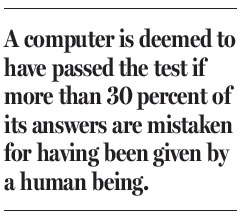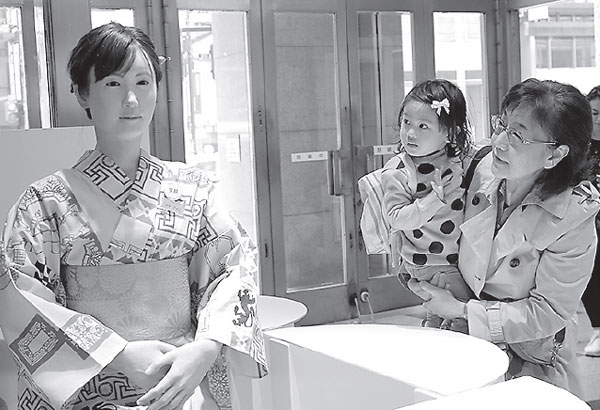Baidu chasing Google in race to create real AI
Since Alan Turing proposed the concept of artificial intelligence in the 1950s, human beings have exerted great efforts to create machines that can think and communicate like humans.
To see if a computer can think like a human, he fashioned a test, later called the Turing Test, in which a computer is submitted to a five-minute blind assessment given by human questioners. A computer is deemed to have passed the test if more than 30 percent of its answers are mistaken for having been given by a human being.
In June 2014, media reports claimed that "the 65 year-old iconic Turing Test was passed for the very first time by supercomputer Eugene Goostman during Turing Test 2014 held at the renowned Royal Society in London".
|
Customers watch android robot Aiko Chihira at the reception of Mitsukoshi department store in Tokyo. The lifelike android robot marked its first day at work as a receptionist at the department store, greetings customers as they walked in. Shizuo Kambayashi / Associated Press |
Eugene Goostman, simulating a 13-year-old boy from Ukraine, achieved 33 percent.
However, some researchers questioned the success by pointing out that by making the computer a 13-year-old boy from Ukraine gave it an advantage, as when it provided some odd answers in English. Others identified the supercomputer as only a chatbot without artificial intelligence, and said many other chatbots - including Cleverbot that achieved 59 percent in 2011 - had also claimed to have passed the test. But they are not AI.
One of the most exciting achievements in the development of AI technology in recent years is the breakthrough made by Google's DeepMind team in London.
The team's Deep Q-Network algorithms can learn to play new computer games like Breakout or Spaceship Invaders. Gradually, the algorithms will play better and better by accumulating experience in previous rounds, and in some cases, they can even develop new strategies.
"Whether robots can overtake human beings depends on the learning ability of robots," says Qu Daoqui, chief executive officer of Siasun Robots & Automations in Shenyang.
Christopher G Atkeson, professor in the Robotics Institute and Human-Computer Interaction Institute at Carnegie-Mellon University, is one of the scientists who help to create the lovely inflatable caregiver robot Baymax in the animation film, Big Hero 6.
"I believe this achievement is the best of its kind at learning to play video games. I believe these learning techniques are also doing well in speech recognition and vision," he says in an e-mail response to China Daily, referring to Google's efforts.
"This is a step forward, but not a complete solution to AI," he qualifies. One of the bottlenecks for AI is "we do not yet have a general theory of how thinking works. We can (only) develop algorithms for specific tasks."
Michael A Osborne, associate professor in machine learning at the University of Oxford, shares a similar view.
"The DeepMind team has made amazing advances at the frontiers of deep learning and reinforcement learning. Nonetheless, I think all at DeepMind would recognize the substantial challenges that remain in developing full AI.
"We're still far from being able to reproduce in software the deep understanding of our environments, like societal norms and cultural cues, that comes naturally to us given only limited examples," he says.
Just as Google positions itself as an AI company, China's search engine giant Baidu is also investing heavily in AI development.
Since 2013, Baidu has been working on a cutting-edge project Baidu Brain. With a strong research and development team, the project uses computer to simulate human brain and has achieved the intelligence level of a three-year-old.

In 2014, Baidu poured 7 billion yuan - 15 percent of its total revenues - into R&D. Last year, registered patents of Baidu also soared to nearly 2,000 items, up 146 percent compared with the previous year. And 25.4 percent is relevant to AI, including 270 items in Neuro-Linguistic Programming and 120 in Deep Learning.
"China's AI research and development does not lag far behind those in developed countries," said Baidu CEO Robin Li at the Chinese People's Political Consultative Conference.
Baidu's Deep Speech can recognize speech in noisy surroundings like in a restaurant as often as 81 percent, higher than the 65 percent of other commercial speech-recognition application programming interfaces, according to a Forbes report.
Another major breakthrough for Baidu last year was to develop software that can describe a picture with languages. This technology will allow people to search for pictures with oral instructions, and will especially benefit the blind.
Based on its R&D, Baidu is developing applications including Baidu Magic Mirror, Carlife, self-driving cars and robots.
When you get up in the morning and look into the magic mirror, it will tell you what to do with your face - shave or apply cosmetics. You can also read the news on it.
When you need to go out, Carlife will tell you the best way to travel to your desired location and point out the best parking lot. The self-driving car will ferry you to the location. You can take the robot with you so that it will help you deal with various information and work and chat with or entertain you.
Life could seem much easier in the future, especially for people with disabilities.
(China Daily 04/25/2015 page14)



















